StorPool Storage Features
What makes StorPool unbeatable
storage for your cloud
storage for your cloud
Reliability, High Availability & Data Integrity Features
StorPool provides an unmatched level of reliability and high availability for your private and public cloud storage. This is due to its fully distributed shared-nothing architecture and remarkable design. StorPool uses the most advanced replication and end-to-end data-integrity mechanisms on the market. It stores copies of the data on different physical servers and protects your storage from drive, server, or other hardware components failure.
 |
End-to-end data integrity
StorPool has the most advanced end-to-end data-integrity mechanism on the market today. We have developed a proprietary 64-bit end-to-end data integrity checksum to protect our customer’s data. |
 |
Backups and Disaster Recovery
StorPool offers a number of backup mechanisms. All users can create periodic snapshots in their primary storage system. Off-site backups and DR are also available through StorPool’s snapshots. |
 |
Distributed, shared-nothing architecture
StorPool’s storage architecture ensures no single point of failure. The storage architecture gurantees its continous work even if a component fails. |
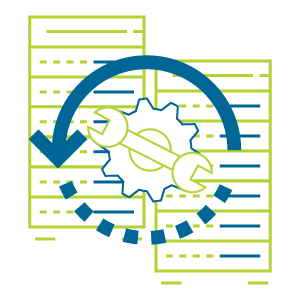 |
Automatic recovery
StorPool handles transient drive failures by re-testing and putting it back in the cluster, thus saving time and headaches for the operations teams. |
 |
In-service software upgrades
Upgrades between major or minor releases are non-service affecting and do not interrupt end-user operations, thus can be performed at any time. |
 |
Multi-attach
StorPool volumes can be attached and read/written at multiple clients at the same time. This is useful to clustered, shared-storage file systems. |
 |
Three-way synchronous replication
Your storage solution provides a triple data replication, which guarantees your data safety and durability. The system continues smooth work even in case of simultaneous drive failures or silent data corruptions occur. |
 |
Single VLAN
The network topology and configuration ensure that the system continues to work in most network failure scenarios. This allows for network problems to be fixed without affecting the system. |
 |
Online configuration changes
Most system parameters can be changed on the fly without affecting the running system. Тhis is giving great flexibility while using the storage. |
 |
Networking protocol for max. throughput & low latency
The network protocol for StorPool is designed in-house, with storage operations in mind, allowing it to guarantee extremely low latencies and full utilization of the network. |
 |
Network redundancy
StorPool transparently utilizes two network ports, handling failures in a seamless way that is not dependent on any extra network configuration or complexity.. |
 |
Fault sets
The system allows marking a set of nodes that are together in a “fault set”. Any fault stores a maximum of one copy of the data. This allows the “fault set” to stop without affecting the rest of the system. |
Performance Features
With StorPool you benefit from a block storage platform with exceptional performance. Get the best out of your storage infrastructure, and minimize the latency of your storage clusters. You can scale out your new cloud architecture independently by IOPS, storage space, and bandwidth and start utilizing the infrastructure in a better and more efficient way.
 |
Advanced copy-on-write on-disk format
StorPool has a unique way of writing and storing data on disks, so that we can achieve different data management features (such as snapshots) without affecting the performance of the storage system. |
 |
Data tiering
Data tiering allows users to make groups, (pools) of drives on which to place data. It also allows building of hybrid pools – copy of the data is stored on SSDs and redundant copies are stored on HDDs. It’s possible to further limit the tiers by IOps and bandwidth. |
 |
Distributed, scale-out cluster architecture
StorPool’s storage architecture ensures no single point of failure. The storage architecture gurantees its continous work even if a component fails. |
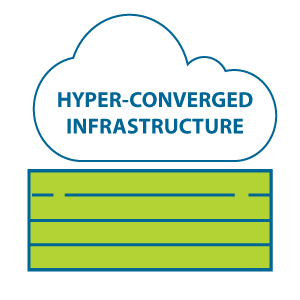 |
Hyper-converged Infrastructure
StorPool supports both converged and hyperconverged storage implementations. In the converged manner you have a single building block for your datacenters by combining compute and storage on the same node. |
 |
10/25/40/56/100 GbE Ethernet support StorPool provides 10/25/40/56/100 GbE Ethernet support. Choose a network according to your needs and future growth plans to ensure the best performance for your cloud. |
 |
Multi-core processing
StorPool allows for some of its components to scale to multiple cores, allowing for a linear performance boost. |
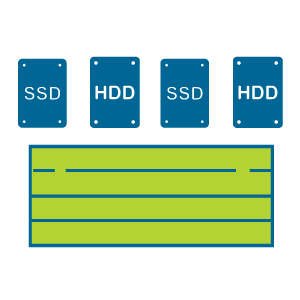 |
NVMe support
StorPool has drivers for direct use of NVMe devices. This architecture allows for very low latency when communicating with the devices, by bypassing the kernel and other layers. |
 |
Zeroes detection
StorPool does not store zeroes, thus saving space for empty or wiped volumes. This feature is part of our space-savings sets, which increases the ROI of your storage system and enables you to store more data on the same hardware. |
 |
Snapshots and clones
StorPool has a low-cost space-efficient performant snapshots and volume clones, allowing for flexible use of templates and “golden” images. |
 |
Networking protocol for max. throughput & low latency
The network protocol for StorPool is designed in-house, with storage operations in mind. This is allowing it to guarantee extremely low latencies and full utilization of the network. |
 |
Native Hardware Acceleration for selected NICs
StorPool has drivers for direct use of network cards, allowing for very low latency when communicating with the devices, by bypassing the kernel and other layers. |
Ease of Use and Deployment
StorPool comes as a fully managed storage solution, which makes it easy to implement and use. It provides a Command Line Interface (CLI) for the administration of the data storage solution that makes configuration and provisioning easy. In addition, you can use StorPool’s API for storage management and monitoring. However, all installations, configurations, and updates can be performed by StorPool’s team of skillful administrators to make it easy for you.
 |
Advanced volume management
Volumes can be resized, snapshotted, cloned on the fly, without affecting the user operations to the volumes or the system as a whole. |
 |
Backups and Disaster Recovery
StorPool offers a number of backup mechanisms. All users can create periodic snapshots in their primary storage system. Off-site backups and DR are also available through StorPool’s snapshots. |
 |
Hyper-converged Infrastructure
StorPool supports both converged and hyperconverged storage implementations. In the converged manner you have a single building block for your datacenters by combining compute and storage on the same node. |
 |
In-service software upgrades
Upgrades between major or minor releases are non-service affecting and do not interrupt end-user operations, thus can be performed at any time. |
 |
iSCSI support StorPool has a redundant, shared-nothing iSCSI target that allows it to export volumes to systems that don’t support the native StorPool driver or have specifal requirements, for example Microsoft’s Cluster Shared Volumes. |
 |
Multi-attach
StorPool volumes can be attached and read/written at multiple clients at the same time. This is useful to clustered, shared-storage file systems. |
 |
Templates
StorPool’s API and tools provide convenient abstractions (templates) for easier creation of volumes with specific pre-set parameters. |
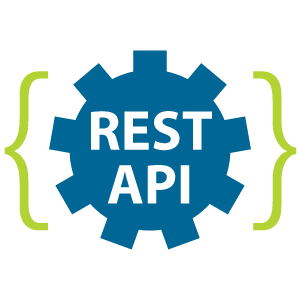 |
RESTful JSON API with API failover StorPool provides a RESTful JSON API. The JSON API exposes all of the available functionality, so customers can do full automation or an API integration, with existing management systems. |
 |
Advanced Monitoring & Statistics
Your storage system comes with a monitoring and analytics tool. Get advantage of advanced real-time statistics to analyze your storage capacity, utilization and performance. Keep better control on your storage system. |
 |
Storage Quality of Service (QoS)
The QoS (Quality of Service), ensures that the required level of storage performance and SLAs are met. StorPool ensures best-of-breed technology and support for you. |
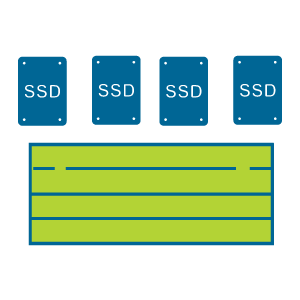 |
Storage pools
One StorPool cluster can have multiple pools of independent or overlaping drives with different parameters. |
 |
Online configuration changes
Most system parameters can be changed on the fly without affecting the running system. Тhis is giving great flexibility while using the storage. |
Efficiency, Space Saving & Cost Savings
The shared storage system reduces the initial cost of deployment and has built-in thin provisioning for better hardware utilization. In addition, StorPool runs on standard hardware, which decreases its TCO.
You’ll benefit from the greater efficiency of your infrastructure, and will stop worrying about unutilized storage capacity. The unique mechanism of data storage enables you to use your data storage platform efficiently without the risk of losing data.
 |
Snapshots and clones
StorPool has a low-cost space-efficient performant snapshots and volume clones, allowing for flexible use of templates and “golden” images. |
 |
Zeroes detection
StorPool does not store zeroes, thus saving space for empty or wiped volumes. This feature is part of our space-savings sets, which increases the ROI of your storage system and enables you to store more data on the same hardware. |
 |
Unique “SSD-Hybrid”
StorPool has a unique way of building hybrid storage solutions. It is called StorPool “SSD-Hybrid”, which keeps 1 copy of data on SSD and 2 redundant copies of data on HDDs. |
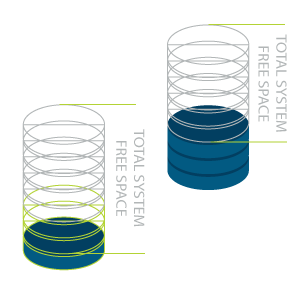 |
Thin Provisioning
Thin provisioning is a storage capacity saving feature. It allows you to provision more storage visible to users than physically available on the system. |
 |
Hyper-converged Infrastructure
StorPool supports both converged and hyperconverged storage implementations. In the converged manner you have a single building block for your datacenters by combining compute and storage on the same node. |
 |
TRIM/Discard
TRIM, in combination with StorPool’s thin provisioning and Snapshots and Clones feature will extend the available space, hence will enable the use of the StorPool cluster by more users. This virtually means no waste of space. |
Ease of Integration
With StorPool you’ll get a fully managed enterprise storage solution with built-in tools for simplified integration and deployment. The powerful software-defined storage is packed with 24/7 qualified technical support. You won’t need a whole team of storage experts in-house. Our qualified team will assist you with every step of the process and every question you might have.
 |
Advanced volume management
Volumes can be resized, snapshotted, cloned on the fly, without affecting the user operations to the volumes or the system as a whole. |
 |
Backups and Disaster Recovery
StorPool offers a number of backup mechanisms. All users can create periodic snapshots in their primary storage system. Off-site backups and DR are also available through StorPool’s snapshots. |
 |
Multi-core processing
StorPool allows for some of its components to scale to multiple cores, allowing for a linear performance boost. |
 |
Online configuration changes
Most system parameters can be changed on the fly without affecting the running system. Тhis is giving great flexibility while using the storage. |
 |
iSCSI support StorPool has a redundant, shared-nothing iSCSI target that allows it to export volumes to systems that don’t support the native StorPool driver or have specifal requirements, for example Microsoft’s Cluster Shared Volumes. |